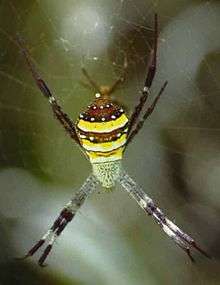Argiope aetherea
Argiope aetherea is a common, large orb-web spider (family Araneidae). Like other species of Argiope, it is commonly known as the St Andrew's Cross spider, due to the characteristic cross-shaped web decorations female spiders often include in their webs. A. aetherea is similar in appearance to A. keyserlingi, however female A. aetherea are generally larger than A. keyserlingi.[2] Like most orb-web spiders, A. aetherea shows considerable sexual size dimorphism, with females being many times larger than males.
| Argiope aetherea | |
|---|---|
 | |
| Scientific classification | |
| Kingdom: | Animalia |
| Phylum: | Arthropoda |
| Subphylum: | Chelicerata |
| Class: | Arachnida |
| Order: | Araneae |
| Infraorder: | Araneomorphae |
| Family: | Araneidae |
| Genus: | Argiope |
| Species: | A. aetherea |
| Binomial name | |
| Argiope aetherea (Walckenaer, 1841)[1] | |
| Synonyms[1] | |
| |
Distribution
Argiope aetherea is found from China to Australia.[1]
Subspecies
There exists a subspecies from New Guinea:
- Argiope aetherea annulipes Thorell, 1881
gollark: Nuclear power plants put LESS radioactive stuff into the air than coal ones.
gollark: I mostly just blame people for being idiotic and going "nuclear! But I don't want to start glowing green!!!!!".
gollark: It's really just the best source of energy.
gollark: Yes.
gollark: Mostly we just need saner large-scale policy and industry (seriously why do we not use nuclear power AÅAAAAAAAAAAAAAAAAAAAAAAAÆÆÆÆÆÆÆÆÆÆÆ).
References
- "Taxon details Argiope aetherea (Walckenaer, 1841)", World Spider Catalog, Natural History Museum Bern, retrieved 2016-05-07
- Levi H. W. (1983). "The Orb-Weaver Genera Argiope, Gea, and Neogea from the Western Pacific Region (Araneae: Araneidae, Argiopinae)" (PDF). MUSEUM OF COMPARATIVE ZOOLOGY. Harvard University. Retrieved 2017-11-26.
| Wikimedia Commons has media related to Argiope aetherea. |
This article is issued from Wikipedia. The text is licensed under Creative Commons - Attribution - Sharealike. Additional terms may apply for the media files.